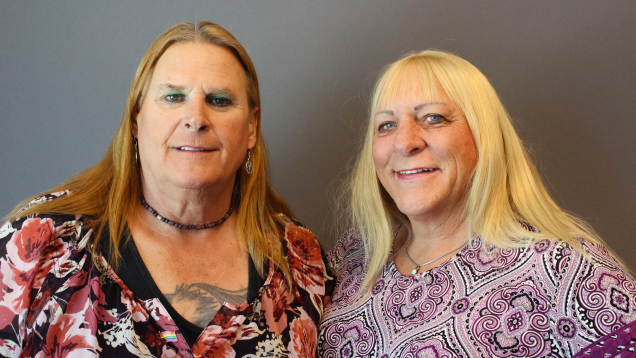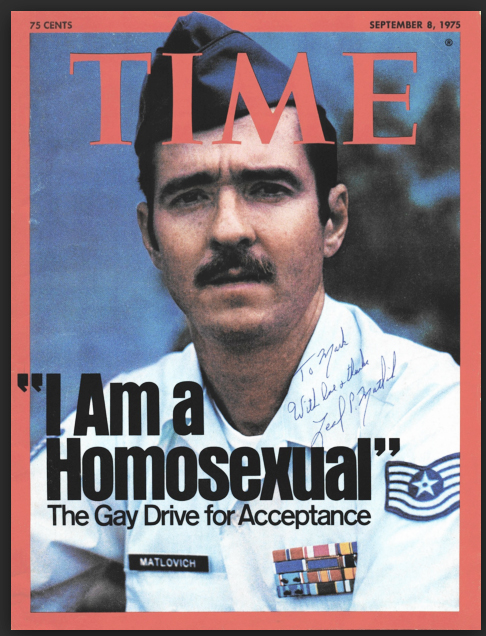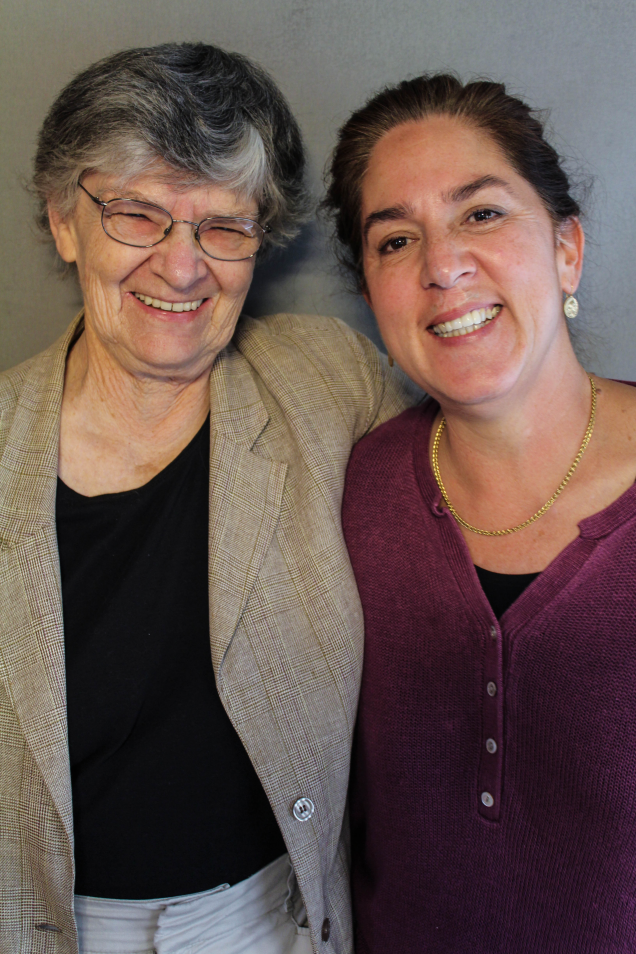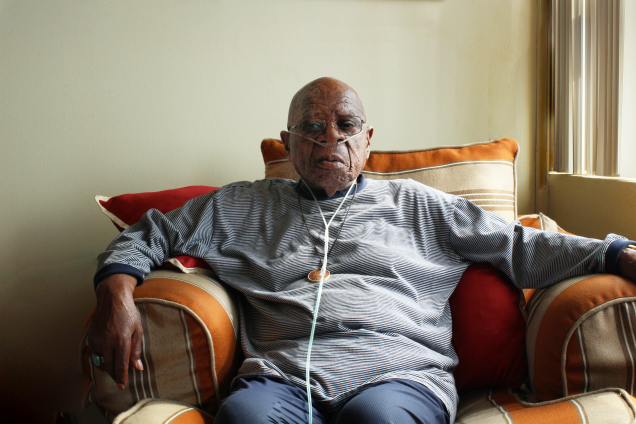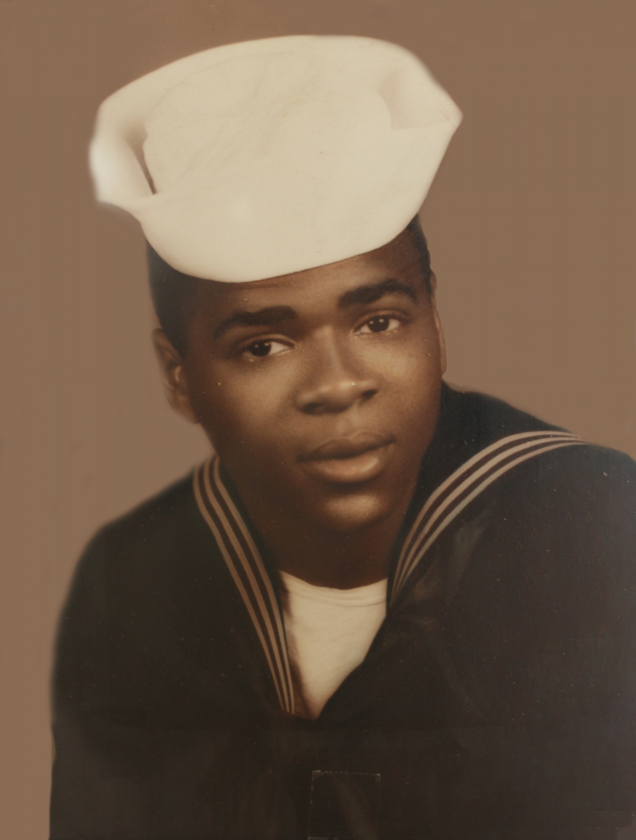Host Jasmyn Morris (JM): It’s the StoryCorps podcast from NPR… I’m your host Jasmyn Morris…
This season, in honor of the 50th anniversary of the Stonewall uprising, we’re highlighting LGBTQ voices…and in this week’s episode, we’ll hear from our nation’s veterans…
Since as far back as the Revolutionary War… LGBTQ servicemembers have been discriminated against in various ways…
The most recent example took effect just last month, with the Trump administration’s controversial policy regarding transgender troops. The Pentagon says it’s necessary to protect military readiness…..but it’s also been called a “ban”… which prevents the majority of trans people from serving their country.
Though this policy and others before it…didn’t stop an untold number of people from serving while remaining in the closet… people like Kristyn Weed and Sue McConnell…two Vietnam-era veterans who met at the Tucson, Arizona VA… where more than a hundred veterans who identify as transgender go for support. Now, you should know that this episode features veterans telling it like it is…and sometimes that involves strong language… including the mother of all curse words…
Kristyn Weed (KW): I spent 15 years in the Army and I enlisted, of all places, as a paratrooper going to the 82nd Airborne Division. And the units I was in, the soldiers were pretty hard-charging so that was the image you had to portray. I didn’t start wearing women’s clothes until I was out of the military. I wouldn’t do it because I was afraid.
Sue McConnell (SM): Oh in the military, yeah. But then, we met at the transgender support group and we started joking and then just like nitpicking at each other and stuff—
KW: [laughs]
SM: —people said, ‘Well you guys really are sisters!’ We do sit around and talk a lot. We would sit in Denny’s for coffee at like 2 o’clock in the afternoon and it’d be dark—
KW: And leave there at 10 o’clock at night
SM: —10 o’clock at night.
SM & KW: [laughs]
KW: The servers all know us, the managers know us.
SM: She flirts with all the waitresses.
KW: Me? [laughs]
SM: Yes, you do!
SM & KW: [laughs]
KW: We get twenty percent military discount!
SM: Yes, we do!
KW: [laughs] I didn’t start transitioning until I was 58.
SM: I guess I was 50.
KW: How did your family accept you?
SM: Well, my son disowned me. He told his mother that he didn’t want anything to do with the fucking freak. So I don’t get to talk to my grandson or my granddaughter.
KW: My family is similar to yours.
SM: Your daughter disowned you?
KW: Both my daughters disowned me, yeah.
SM: Yeah… When I was growing up, I always knew there was something different. I didn’t like the same things the other boys did. You know, they wanted to play Army and cowboys and Indians. And I wanted to be the girl on the wagon that was sewing and making coffee [laughs].
KW: Right.
SM: But you know, I had to be who I wasn’t so that I could survive.
KW: Yeah… You know, it hurts to have lost my daughters, but, uh, I found out love is not a two way street and love is not unconditional.
SM: It is for some of us…
KW: You’re always there for me. There’s never a doubt or question as to whether you would be or not.
SM: You are my sister.
KW: I’m glad of it.
Host JM: That’s Kristyn Weed with her friend Sue McConnell, in Tucson, Arizona.
Kristyn first enlisted back in 1975… the same year that Technical Sergeant Leonard Matlovich received national attention for outing himself as gay while serving in the Air Force. He was kicked out… even though he had been decorated with a Bronze Star and a Purple heart.
At StoryCorps… his friend Jeff Dupree <doo-PRAY> sat down to remember him…
Jeff Dupre (JD): I don’t know a lot of people that called him Leonard. Everyone called him Mat. I met him at a Thanksgiving dinner. We were sitting in the living room and we were watching Macy’s Day Parade on Thanksgiving Day.
He didn’t say too much at all until, um, someone started saying, ‘Mat what are you up to?’ And that’s when Mat opened up.
He said, ‘Well you know they’re looking for a candidate to challenge the gays in the military laws. They’re looking for an officer, preferably. Someone who has a good record to make it legal to be in the service and be open. I’ve got these awards from the service, I think I can do it.’
And the guy said, ‘Matt, no way. You’re too quiet. You’re not out. You’re not ready for that.’ Well the subject changed and that was about it for that day.
David Phillips (DP): Tell me about the day you saw him on the cover of Time magazine.
JD: I mean it was pretty wild. There it was on the rack. He was glancing up, shiny eyes, curly hair, with the headline: “I Am A Homosexual”. And I just stared at it. I just couldn’t believe it.
When he called, all I could do was tell him how proud I was of him. And then I didn’t hear from him for a while and he died of AIDS. He was young, 44 years old. I didn’t even know he was sick. He was buried in DC, and uh, his headstone does not have his name on it. It strictly says, A gay Vietnam veteran, and uh, the inscription on it is, ‘When I was in the military they gave me a medal for killing two men and a discharge for loving one.’
He was the epitome of a perfect soldier, one of those people that stuck his neck out, and he was proud to be the person to challenge that law.
Host JM: That’s Jeff Dupree with his husband, David Phillips, remembering US airman Leonard Matlovich.
While Matlovich wanted to remain in the Air Force… that was only an option if he signed a document saying he would <quote> never practice homosexuality again.
Leonard Matlovich, Good Morning America (LM): I really wanted to stay in but I couldn’t live with my conscience. I was caught between the devil and the deep blue sea.
Host JM: That’s Matlovich on Good Morning America in 1987… being interviewed by Charlie Gibson…
Charlie Gibson, interviewer for Good Morning America (CG): What’s your feelings now, 12 years down the pike, about the military?
LM: Well, I will always have a fond place in my heart for the military. I grew up in it… you know, my hometown. They need to be educated. They need to change for lesbians and gays because we are American citizens. We pay taxes. We are moral good people who contribute to society and make society a better place. And they’ve got to change their policy.
CG: Of course, to a lot of people you’re committing a sin against God.
LM: Well, I usually say to people when they say that to me, is my God’s a very very loving God. The only crime I have ever committed is a crime of love and no other crime. And if that’s a crime against humanity, let me commit more crimes against humanity.
CG: When did you find out you had AIDS?
LM: Uh well, I went to the… I had a chest-cold and I went to the hospital and, uh… to get medicine for a chest-cold and the doctor said to me, ”Oh guess what? This is not a chest-cold. You have AIDS.”
CG: When he told you, were you surprised?
LM: Shocked but not surprised because it’s something as a gay man I had been dealing with for the last five years; you’re wondering, you know, When is my turn? My turn came.
I don’t know how long I have to live–I could die tomorrow; tomorrow they could find the cure–but what I’m promising you is that, whatever amount of time I have left, I’m going to make the most of it.
Host JM: That was Leonard Matlovich… who died a year later from complications related to HIV/AIDS…
In his last year… he was an outspoken critic of the government’s silence around the AIDs crisis. And each year since his death… there’s been a Memorial Service held by gay veterans at his graveside…
After a short break… we’ll hear from two service members on life after they were classified as “undesirable” by the military…
Stay with us…
[SPONSOR]
[PROMO]
Host JM: Welcome back…
When US airman Leonard Matlovich came out in the mid-1970s … he was given an honorable discharge… But this type of discharge wasn’t usually the case for LGBTQ people. It’s estimated that tens of thousands were banned from the military with less than honorable discharges. Meaning, they lost access to their military benefits, future job prospects, and any distinction that came with serving.
Next, you’ll hear excerpts from two separate StoryCorps interviews with veterans who were kicked out of the service… 15 years before Matlovich…
Air Force veteran Jeri Dilno… went through this in 1960. You’ll also hear from Joseph Patton… a veteran of the US Navy. Just a heads up, Joseph relies on an oxygen machine, which you can hear in the background.
Jeri Dilno (JDi): I was born into a military family. My father was in the Navy when I was born. I grew up in the middle of World War II. I can remember when we first got a television set, they would play the Star-Spangled Banner and I would be sitting on the couch and I’d stand up at attention. It was just our way of life.
So when I turned 21–although I’d had a lesbian experience by then–I signed up to be in the Air Force. And that was 1958 so I knew the perils were there.
Joseph Patton (JP): My name is Joseph Patton. I was 17 when I went in the service in 1956.
Growing up I was curious, so I would go to libraries looking up the word “homosexual.” It felt like you were some type of disease or some animal from another world.
My dad told me going in the service would help me be a man; but I chose the Navy because I like the uniforms (laughs). They were tight and cute with bell bottoms; Lord have mercy.
And when I was in bootcamp, we were in San Diego and we went to a gay bar. I was exploring my sexuality but they had military police walking around to check and see if there were any service men in uniform in any of these gay bars. They did a lot of stuff like that. You could not be gay in the service at that time.
JDi: They would inspect your room without notice. In fact, at the time my brother was about 13 and he used to write to me in a code like young boys will do. And I had a sheet that delineated what the code was and they found this. I can still remember this lieutenant kind of being very excited when he had this in his hand and, uh, he was quite disappointed when he found out that it was not the lesbian code.
JP: There was a group of us that hung out together. We drank together, we played cards together, we became friends. Then the investigation started when these two guys told the commanders that they were lovers and wanted to get out of the service. Everybody that were close friends with these guys was arrested and put in the brig. And that was the worst time in my life.
JDi: It’s hard to explain the pressure of a witch hunt. One of the women attempted suicide. And she left a long note naming everybody she could think of that might be a lesbian. She was not successful in her suicide attempt and when she woke up in the hospital, the investigators were sitting beside her bed, asking her detailed questions about the rest of us. So about nine of us came under investigation right away.
During that few months, a friend of mine and I decided one night to go to the drive-in movie. You know, we were just pals; we weren’t in any relationship or anything. We were followed. And I saw somebody at the drive-in theater writing down my license-plate.
The next morning I was ordered to appear at the commander’s office. They supposedly watched my friend and I necking in the car at the drive-in, which we were not doing. And they came back with a decision that I was a homosexual. They gave me an undesirable discharge. I could not get my severance pay. I couldn’t keep my uniform and I was not allowed to ever go on a military base again, the rest of my life.
JP: To be in the service for my country is the greatest thing I thought I did. I was a perfect sailor. I did my job very well. But I was kicked out of the service. They gave me an undesirable discharge for being homosexual or friends with a homosexual. They didn’t know what they were doing about people that were gay; they never did in the service.
JDi: In 1972, I got my discharge upgraded; because of that, I was able to go to the VA. I’m now a disabled veteran. And I still feel very patriotic when I hear the star-spangled banner or see the flag go by, but part of my disability is the mental-stress that they put me through in 1960.
Host JM: That’s Air Force veteran Jeri Dilno… talking with her friend Andrea Villa in San Diego, California.
Jeri is now in her 80s..and she’s also helped other LGBTQ veterans upgrade their discharge status and get access to their military benefits.
Joseph also got his discharge upgraded. He’s currently fighting for full disability compensation from the VA…
It’s been 60 years since he was kicked out of the Navy… but to this day, you can still hear in his voice how much it’s affected him…
JP: You know, that whole period is almost like a dream. A lot of it I didn’t want to think about because it hurt so much. I was so ashamed and felt so guilty about my past. But now I can say, I got an honorable discharge, amen. You know, I can’t live in the past or be trying to live in the future. I gotta be right here right now. Minute to minute, sometimes, hour to hour, I have to remind myself that I’m loved by me and others and by God.
Love has no limits in my life and love surprises me all the time. I see it on your face when you smile. Right now I see it outside because the sun is shining and it’s been gray all day. Sometimes I get up and dance. I shake my ass with life, yes–You gotta shake your ass … I’m 81 fucking years old, man. I’m a lucky bitch, honey. I am lucky. And I’m here? Thank God.
Host JM: That’s Navy veteran Joseph Patton in Santa Monica, California.
That’s all for this episode of the StoryCorps podcast…
It was produced by Jud Esty-Kendall and me. Our engineer is Jarett Floyd. Our fact-checker is Natsumi Ajisaka. Special thanks to Robin Sproul, Good Morning America, Liyna Anwar, Nadia Reiman, Josh Christensen and StoryCorps facilitators Gautam Srikishan, Von Diaz, Mia Warren and Cambra Moniz-Edwards.
Also… in honor of the 50th anniversary of the Stonewall Uprising, we’re asking you, listeners, to participate in a project we’re doing called Stonewall OutLoud…by picking up your mobile device and recording an LGBTQ elder in YOUR community… using the StoryCorps app. We’ll be sharing some of your interviews! Like this one… from Orbit Clanton and his friend….
Orbit Clanton (OC): At 17 when I graduated from high school, I went straight into the Navy and there was a question on your application to join that says, “Are you a homosexual?” And if you checked yes, then you wouldn’t have been able to join the service–
Friend: So you had to mark ‘no”?
OC: Yeah. It was forbidden, so you couldn’t openly, even though there’s a running joke that if you got rid of all the gay that are in the military you wouldn’t have a military.
Host JM: That’s Orbit Clanton recording on the StoryCorps app… To learn more about Stonewall Outloud… go to StoryCorps dot ORG slash-outloud…
While there… you can also get more information on the music you just heard… including our theme song by Patrick Wolf.
Next week… we’ll hear about the role models who made all the difference for two kids coming of age in the 1950’s…
For the StoryCorps podcast, I’m Jasmyn Morris. Thanks for listening…
<FUNDER>
